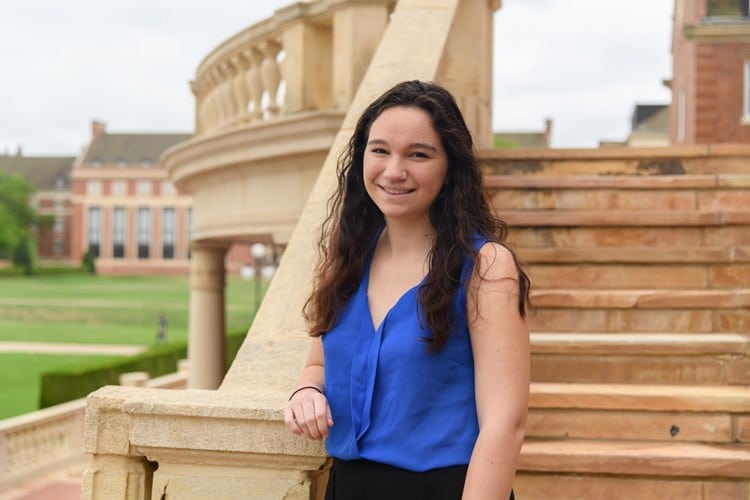
It is not every day that you meet a student like Alex Bias.
Bias is a senior at Oklahoma State University and is triple majoring in chemical engineering, mathematics and political science.
She first became passionate about research as a high school junior. She has worked in four labs during her time at OSU and currently works on computational chemistry alongside Dr. Christopher Fennell, an associate professor in the Department of Chemistry.
“I first got involved with computational chemistry research in 2020 while looking for research that I could continue during the pandemic,” Bias said. “I was a bit nervous about getting into a project so heavily focused on computer programming, as I had little to no experience with coding, but I quickly fell in love with the problem solving and logic involved.”
Fennell noted the significance of Bias’ willingness and drive to get involved in research early on in her college career. He described Bias as intelligent, adaptable and ambitious.
“Computational chemistry is usually something students may get involved with in a class later on,” Fennell said. “Alex was able to pick this up right away.”
Bias’ research within the College of Arts and Sciences (CAS) assisted her in being named OSU’s 30th Goldwater Scholar. The Barry M. Goldwater Scholarship is a prestigious award that was established by Congress in 1986 to support outstanding undergraduate researchers on their path to become highly-qualified future professionals. Out of 1,242 applicants from 433 institutions, Bias was selected. The Goldwater Scholarship opens many doors to Bias as a researcher.
“In computational chemistry, resources are limited because running simulations takes time. If you are running a simulation of a protein in water, you want most of the time for the simulation to be taken by interactions of the protein,” Bias said. “You definitely don’t want to have hours of your simulation taken up by water solvent moving around.”

Bias’ research explores how to address this problem of inefficiency: “My specific project is creating a single-point model for water using spherical harmonic interaction functions,” Bias said. “This calculation allows a water model to be built up from the fundamental interactions that guide its behavior and has the potential for a more efficient and more effective model. The resources required for this model are reduced by a degree of magnitude from the commonly used three-point models (one point for each atom). Using this style of model for water alone is exciting, but perhaps more exciting is the potential to scale up to larger compounds.”
Bias will graduate in spring 2023 and will then pursue a Master’s of Philosophy at the University of Cambridge on behalf of a W.W. Allen Scholarship from Oklahoma State University. She plans to let her time abroad determine the next steps in her career.
To utilize all three of her majors, Bias would like to look at the way foreign policy is constructed through a lens with math and science. The idea of law school was mentioned, but Bias said she may just do research forever because of her love for it.
Written by: Kalynn Schwandt for Oklahoma State University News; used with permission. Find the original article here.
Founded in 1978, the Council on Undergraduate Research (CUR) focuses on providing high-quality and collaborative undergraduate research, scholarly, and creative activity. Among the many activities and networking opportunities that CUR provides, the organization also offers support for the professional growth of faculty and administrators through expert-designed institutes, conferences, and a wide-range of volunteer positions. The CUR community, made up of nearly 700 institutions and 13,000 individuals, continues to provide a platform for discussion and other resources related to mentoring, connecting, and creating relationships centered around undergraduate research. CUR’s advocacy efforts are also a large portion of its work as they strive to strengthen support for undergraduate research. Its continued growth in connections with representatives, private foundations, government agencies, and campuses world-wide provides value to its members and gives voice to undergraduate research. CUR is committed to inclusivity and diversity in all of its activities and our community.
CUR focuses on giving a voice to undergraduate research with learning through doing. It provides connections to a multitude of campuses and government agencies, all while promoting networking and professional growth to its community.


